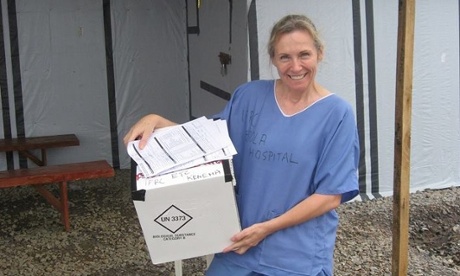Sue Ellen Kovack says medical professionals thinking of travelling to West Africa to help in public health crisis should not be deterred

The nurse at the centre of the Australian Ebola scare has urged other health professionals to travel to West Africa to help fight the virus.
Sue Ellen Kovack, 57, was released from Cairns hospital on Monday after returning a second negative result for the virus. Kovack returned from treating Ebola patients in Sierra Leone last Tuesday and was taken to hospital on Thursday after developing a low-grade fever, sparking fears she could have brought the virus to Australia.
The federal government has given $18m to fight Ebola, which has killed more than 4,000 people, but has said it will not send aid workers to West Africa for fear of putting Australian lives at risk.
In her first public statement since being admitted to hospital Kovack urged Australians to donate to the Red Cross to send more help to West Africa.
“It has been so inspiring and it has really kept me going in the past few days to know there’s growing public support for action to help people affected by Ebola in West Africa,” she said.
“Most importantly to me, I’m sending a message to my fellow medical professionals who are thinking about heading over to treat the sick and work at bringing Ebola under control: please, please do it.”
Kovack said the support she had received from around the world had made the past week “quite emotional”.
“The past few days have been a worrying and taxing time and it has meant I’ve not had much time to fully process the challenges I had in West Africa, treating people sick with Ebola, seeing people die and helping to control this dreadful virus,” she said.
The Public Health Association of Australia (PHAA) is sending a letter to Tony Abbott, signed by health professors, urging more direct help for countries affected by Ebola.
“The best means of protecting Australia and other high-income countries is for robust control efforts at the source of the outbreak,” the letter says.
“The Ebola outbreak in West Africa is a global health catastrophe which threatens future economic prosperity, regional political stability and human health globally. It is in our national interest to ensure the epidemic is contained.”
The letter was circulated to health professors on Friday afternoon and gained 30 signatures within two hours, PHAA chief executive Michael Moore said.
He said the association had purposefully restricted the letter to health professors as they did not want to turn it into a petition.
“These are the people who understand the risks, people with serious expertise in this area believe it is important and appropriate for Australia to send health professionals over there,” Moore told Guardian Australia.
Moore said non-government organisations in west Africa needed personnel and facilities. He said only 10-20% of Ebola patients were being treated in treatment centres and that number needed to rise to about 70% to stop the virus spreading more quickly.
He said while Abbott had valid concerns about the safety of Australian health workers, the logistics could be worked out.
“Evacuation of any of our people who contract Ebola is of course the concern and it’s a sensible concern the prime minister has raised, but we’re not beyond being able to organise with the United Kingdom, the United States, Norway, France, other countries who have evacuation systems in place to be able to work with them to deal with this sort of situation,” Moore said.
He said Australia had evacuation plans in place with allies for soldiers seriously injured in the Middle East conflicts and could make similar arrangements in West Africa.
Asked why Australia seemed more willing to intervene in military conflicts than health crises, Moore said: “It’s politically great to be seen to be strong [by intervening militarily], Maggie Thatcher showed that, but this is a crisis we don’t seem to be strong on.”
“If you look at it from a selfish perspective, people seem to be thinking why are we worrying? It’s just Africa’.”
The PHAA will circulate the letter until Tuesday and send it to the prime minister on Wednesday.
Moore said he was “disappointed” one of the people he had sent the letter to had leaked it to the media before the prime minister had seen it.
“I feel it’s impolite,” he said.
